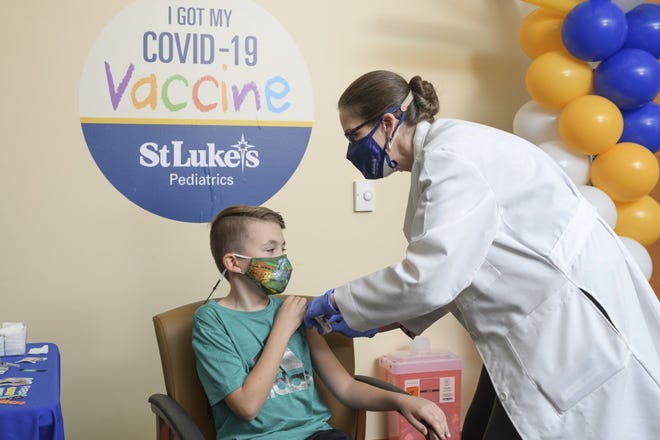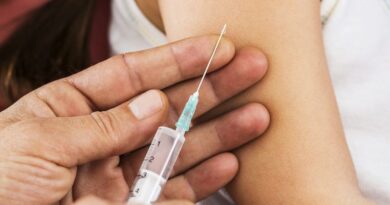PolitiFact: Yes, there have been placebo-controlled studies on childhood vaccines

Statement: “There’s never been a placebo-controlled study on childhood vaccines.”
In picking Robert F. Kennedy Jr. to lead the U.S. Department of Health and Human Services, President-elect Donald Trump is elevating a small but growing segment of the population that distrusts vaccines and spreads or follows misinformation about them.
Kennedy is a longtime vaccine skeptic who founded the major anti-vaccine group Children’s Health Defense and has repeatedly promoted a debunked theory that vaccines cause autism.
Although he has recently distanced himself somewhat from this stance, declaring he would not “take away anybody’s vaccines” after Trump was elected, his unorthodox views on medicine are raising concern from medical professionals — and some on Capitol Hill. That includes Sen. Mitch McConnell, R-Ky., who wrote in a Dec. 13, 2024, statement that “efforts to undermine public confidence in proven cures are not just uninformed — they’re dangerous.”
Kennedy has an ally, however, in Sen. Ron Johnson, R-Wis., a skeptic of COVID-19 vaccines who has promoted vaccine falsehoods. Johnson said on X that he “could not be happier” about Trump tapping Kennedy and said he hopes to work “very closely” with him on exploring issues such as vaccine efficacy.

Asked on WISN’s “Upfront” on Nov. 17 about his praise for Kennedy and false claims about vaccines causing autism, Johnson said he wants to look at “uncorrupted” science when determining vaccine safety and that people “need to have the courage to ask what is causing this explosion” in autism and chronic illness.
“There’s never been a placebo-controlled study on childhood vaccines. Not one,” Johnson said.
Medical experts say he’s wrong on that.
Vaccine skeptics debate meaning of ‘placebo’
Asked for evidence of his claim, a spokesperson for Johnson sent a tweet from Aaron Siri, an attorney advising Kennedy. Siri shared a chart from the vaccine-skeptical group Informed Consent Action Network showing 17 vaccines that they allege were not licensed by the U.S. Food and Drug Administration “based on a long-term placebo-controlled trial,” including vaccines for whooping cough; measles, mumps and rubella; HPV; COVID-19; and influenza.
Johnson’s office also shared an interview Kennedy did on “The Joe Rogan Experience” in which he recalled an exchange with Dr. Anthony Fauci, former director of the National Institute of Allergy and Infectious Diseases. Kennedy claimed he asked Fauci to present him with evidence that vaccines recommended for Americans had been tested in a placebo-controlled study, and that Fauci could not.
Placebo-controlled trials are considered the gold standard for testing the safety and efficacy of a new vaccine, according to experts from the World Health Organization. The placebo exists to mimic the experience of getting the vaccine so the people receiving it don’t know which group they’re in.
Some groups that are skeptical of vaccine safety take issue with the definition of a placebo. Dr. Paul Offit, a physician and director of the Vaccine Education Center at Children’s Hospital of Philadelphia, wrote July 1, 2023, on Substack that the Informed Consent Action Network argues that the only true placebos are water and saltwater, “which isn’t true.”
“Indeed, a wide range of placebos have been used in vaccine trials,” Offit wrote. “These placebos might contain buffers, stabilizing agents, emulsifying agents, or adjuvants, like aluminum salts. They might contain sodium citrate, sodium phosphate, sucrose or polysorbate-80 … all meet the FDA criteria for a placebo.”
For example, RotaTeq, a vaccine for rotavirus, appears on the Informed Consent Action Network chart; the group says it was not licensed based on a placebo-controlled trial. According to the FDA, the placebo in that trial contained sucrose, sodium citrate, sodium phosphate, tissue culture medium and polysorbate 80.
“When I look at the ICAN report, I’m just wondering whether they’re playing with words a little bit,” said Dr. William Moss, executive director of the International Vaccine Access Center at the Johns Hopkins Bloomberg School of Public Health. “We often think of a placebo as a comparator group. … You have one group that receives the vaccine of interest, and the other group receives something else.”
There have been childhood vaccine studies using saltwater placebos

Still, even using that narrower definition of a placebo — that it’s a simple saltwater solution — Johnson is wrong.
Here are a selection of childhood vaccines that went through placebo-controlled trials in which the placebo used was a saline solution:
Thus, it’s factually inaccurate for Johnson to say that there has never been a placebo-controlled study on childhood vaccines.
Sometimes new vaccines are tested against old vaccines
Where else might these claims come from that vaccines haven’t undergone a placebo-controlled trial?
In some situations, Moss said, the “comparator group” may receive a previously approved vaccine that targets the same disease to determine whether a new vaccine performs better (or performs the same and is cheaper to make).
Why test a new vaccine against an old vaccine and not an inert placebo?
If a vaccine against a disease already exists and is working, Moss said, it’s unethical to deprive children of it just to conduct a study. Doing so would put them unknowingly at risk of contracting and getting sick from that disease.
In those cases, Moss said, the vaccine given to the comparator group would be a licensed and approved vaccine that “would have gone through all the hurdles it takes to get to that.”
Johnson’s claim didn’t get into these details. He simply said there has been “not one” placebo-controlled study on childhood vaccines. And he’s wrong on that.
Claims like these have “the air of being scientific,” Moss said. “My sense is that this is an approach used by, say, RFK Jr. on calling for transparency in the data and more rigorous assessment of vaccines. Those are good things. I don’t think anyone would argue against that. They’re able to kind of twist it as a way to actually undermine vaccines or at least induce skepticism.”
PolitiFact’s ruling

Johnson stated that “there’s never been a placebo-controlled study on childhood vaccines.”
Medical experts say the evidence his office provided takes a narrow view of what a placebo is.
But even by that definition, there have been studies of childhood vaccines that were placebo-controlled.
We rate this claim False.
Our sources
- University of Minnesota, “US survey reveals growing distrust of vaccines, embrace of untruths,” Nov. 1, 2023
- Factcheck.org, “What RFK Jr. Gets Wrong About Autism,” Aug. 10, 2023
- NBC News, “After Trump win, RFK Jr. says he won’t ‘take away anybody’s vaccines,’” Nov. 6, 2024
- USA TODAY, “Mitch McConnell takes a swipe at Robert F. Kennedy Jr. over polio vaccine,” Dec. 14, 2024
- Milwaukee Journal Sentinel, “‘He doesn’t understand medicine is a science’: Ron Johnson escalates ‘guerrilla war’ against medical establishment,” May 5, 2022
- PolitiFact Wisconsin, “Johnson wrong on claim that COVID vaccines are killing athletes on the playing field,” Jan. 28, 2022
- PolitiFact Wisconsin, “What Ron Johnson gets wrong about the COVID-19 vaccines,” April 23, 2021
- Milwaukee Journal Sentinel, “Ron Johnson poised to scrutinize federal agencies, ‘work closely’ with Robert F. Kennedy Jr.,” Dec. 17, 2024
- National Library of Medicine, Placebo use in vaccine trials: Recommendations of a WHO expert panel, Aug. 20, 2014
- Substack, “Paul Offit: The Casual Cruelty of Placebo-Controlled Trials,” July 1, 2023
- Interview with Dr. William Moss, executive director, International Vaccine Access Center at the Johns Hopkins Bloomberg School of Public Health
- The Lancet, Safety and immunogenicity of a parenteral trivalent P2-VP8 subunit rotavirus vaccine: a multisite, randomised, double-blind, placebo-controlled trial, July 2020
- World Health Organization, A Comparative Study of Four Live Measles Vaccines in Israel, accessed Dec. 27, 2024
- National Library of Medicine, PubMed, Safety and persistent immunogenicity of a quadrivalent human papillomavirus types 6, 11, 16, 18 L1 virus-like particle vaccine in preadolescents and adolescents: a randomized controlled trial, March 26, 2007


